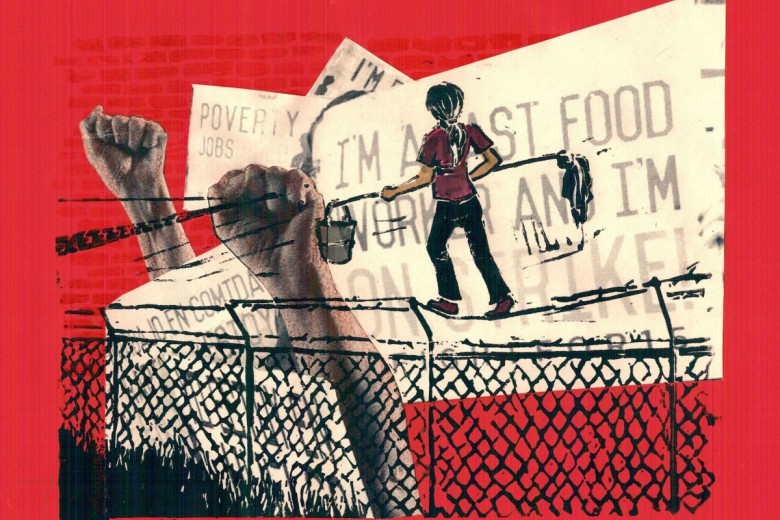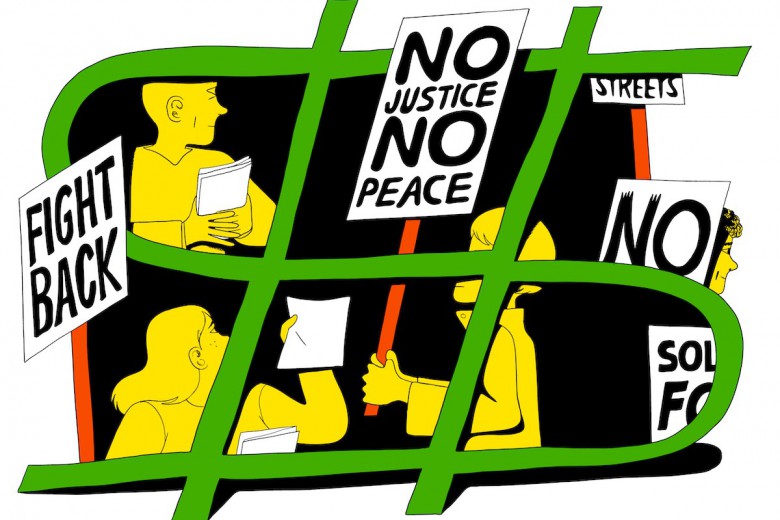
Nandita Sharma is an activist, scholar, and the author of Home Economics: Nationalism and the Making of ‘Migrant Workers’ in Canada (University of Toronto Press, 2006), and “Anti-Trafficking Rhetoric and the Making of a Global Apartheid” (NWSA #17, 2005). In this interview, she addresses the effects of anti-trafficking on migrant women doing sex work. She critiques the notion of “trafficking” in the context of the increasing necessity of global migration and the tightening of borders in the global North. According to Sharma, border restrictions, rather than “trafficking,” are the biggest impediment to the self-determination of (im)migrant women in Canada.
Robyn Maynard interviewed Sharma in February 2010 for No One Is Illegal Radio’s edition “Sex Work, Migration, and Anti-Trafficking.” Edited excerpts of that interview were published in Upping the Anti #10, and are reprinted here with permission.
Nandita Sharma
Maynard: How do the government and media use the idea of “sex slavery” to create moral panic? What are the consequences for migrant women doing sex work?
Sharma: Without a doubt, the moral panic against sex work is fuelling the push for anti-trafficking legislation. Most people who are pushing the anti-trafficking legislation also want to eliminate the option for women to enter into sex work. And they want to do that by further criminalizing sex work activity, especially by criminalizing the entry of migrant women into the sex industry.
For example, in Canada the migration of women into sex work is increasingly scrutinized by the state. Not only are there police who continuously raid sex work establishments like strip clubs and massage parlours under the guise of “protecting public morality” or public health; we also have immigration police who are raiding sex work establishments looking for so-called “victims of trafficking.”
Of course, the vast majority of women who migrate do not enter into sex work. But for those women who do, one of the greatest vulnerabilities they face is their status in the country. The lack of legal or permanent status makes migrant women involved in sex work more vulnerable. Many women who are migrants in the sex industry are employed on temporary work visas in the entertainment industry – the visas given to sex workers were recently squashed by the government – or they are forced to work illegally. It is impossible to legally get into Canada as a sex worker and enter as a permanent resident. You don’t get “points” for being in the sex industry, even though there is high demand. The anti-trafficking legislation is another way to attack women’s ability to work in the sex industry, and it does so in a way that further legitimizes (and relies on) the idea that no woman should ever be engaged in sex work. Ultimately, the moral panic against sex work makes migrant women more vulnerable in the sex industry.
What does anti-trafficking legislation fail to address in terms of women’s rights and agency? What are the root causes of what gets called “trafficking”?
The key issue is to understand why, over the last decade, national governments around the world have been pushed to pass anti-trafficking legislation. There is increased migration in the world today, largely resulting from practices of dispossession and displacement through political and economic crises and war. And yet, alongside increased migration, most states – especially in the so-called “First World” – have implemented restrictive policies that prevent more and more people from entering these states legally. The result is that most people who enter these states are considered to have “illegal” status.
Anti-trafficking legislation is used to target so-called “illegal migration.” Instead of placing the blame for migrants’ vulnerability on the restrictive immigration policies of national states that force people into a condition of illegality, it blames those who are actually facilitating their movement across borders. In today’s world, where it is increasingly difficult to enter First World states legally, it is also next to impossible to enter without someone’s help. It’s impossible to simply get on a plane, get on a boat, get into a car, or walk across the border, without some kind of official identity papers. It’s very difficult to get forged visas or forged passports, and to cross without someone helping you across that border. For many of the world’s migrants, the urgent need is assistance with their movement. Anti-trafficking legislation criminalizes people who facilitate migrants’ entry into national states. I think this is the underlying agenda behind anti-trafficking legislation. It offers ideological cover to target both the migrants themselves and the people who facilitate their movement. In this way, anti-trafficking legislation strengthens border policing.
How can we fight the exploitation of women that takes place in sex work without resorting to anti-feminist hysteria and characterizing women engaged in sex work as victims of trafficking?
I think that we need to take our cue from sex workers themselves. Sex worker organizations are very clear on the steps needed to ensure safe, dignified, decent working conditions for women in the sex industry. At the top of the list is decriminalization. The anti-trafficking agenda moves in exactly the opposite direction. It actually further criminalizes sex work by targeting those people, especially in the case of migrants, who are facilitating women’s entry into sex work. Basically, there is a fundamental disagreement between those who want to end sex work and those who want to make sex work safer for women. The fundamental disagreement is whether or not women have the right to engage in sex work. Most people in the anti-trafficking camp believe that there is no way that women can ever engage in sex work without being fundamentally exploited. I disagree with that, as do most sex workers’ organizations. Most of them point out that sex work can be made safer, can be made more dignified – and the way to do that is to stop demonizing those who are engaged in it. Along with decriminalizing sex work, we can support union organizing within the sex industry. This is exactly what some sex workers’ organizations in India, Bangladesh, San Francisco, and elsewhere have attempted. We need to understand sex work as one of the options available to women in a capitalist economy. We need to work, and sex work is a viable option for many women.
Ultimately, if we want to end the exploitation of women, we need to challenge capitalism, which is the basis for all of our exploitation. Whether we’re working in the sex industry, a restaurant, or in a university, we’re being exploited by those who are benefitting from our labour. So, if we want to end exploitation, we don’t give more power to the state to criminalize workers, we give more power to workers to end their exploitation. Of course, being a university professor is not demonized like sex work is. So we also need a major attitude adjustment. Feminists have long been demanding freedom for women, including control over their own bodies and sexuality. Supporting women in the sex industry and recognizing them as part of the broader collective of workers is part of this struggle.
Those of us who are critical of anti-trafficking rhetoric and legislation are often accused of not caring about women. We’re accused of not caring about women who are kidnapped, women who are beaten up, women who are enslaved or not paid wages, women who have their passports and other documents withheld from them so that they’re rendered immobile. In response to these accusations, the important thing to remember is that all of those crimes are already addressed in the Criminal Code of Canada. It is illegal to kidnap people, to beat them up, to rape them, to not pay them wages, to withhold their documents without their permission, etc. Why do people think new anti-trafficking legislation will make women safer when the police seem completely disinterested in enforcing Criminal Code measures that already exist to protect women? Instead of anti-trafficking legislation, we should be demanding that workers in the sex industry are protected under occupational health and safety regulations, as all workers should be. We should demand that illegalized workers have access to the same rights and entitlements as any other worker in the country, which would of course require that we eliminate the distinction between illegal and legal workers. There are many things we can do that do not rely upon further criminalizing people’s movement across borders. This is the challenge we must pose to people who tell us that the only way to protect women – especially in the sex industry – is to criminalize the people who facilitate their entry into it.
Restrictive immigration policies are causing much of the exploitation of “trafficked women.” How do we fight for migrant women’s safety?
Ultimately, the only way that migration is going to be safe for anyone is to decriminalize it. We need to ensure that people have the autonomous right to move whenever they decide it is in their own best interest. If women today could be assured that when they needed to move they could do so freely – without being criminalized, without needing forged papers, without having to get smuggled into the back of a boat or the underbelly of a car – then they would be much safer.
Let me give you two examples of how anti-trafficking legislation actually increases the vulnerability and exploitation that many women migrants face. First, anti-trafficking legislation targets people who are helping women cross borders. This raises the cost of moving across borders and, as a result, women have to go further into debt in order to do so. Second, by imposing these enormous penalties – which, in Canada, can include a life-sentence and in the United States can include a death sentence – those facilitating movement make migrants use routes that are less safe. People are being forced to cross borders in very vulnerable places like deserts and mountains, places where hundreds of migrant bodies are found dead every year. Anti-trafficking legislation is thus making migration less safe for women.



_780_520_90_s_c1.jpg)


